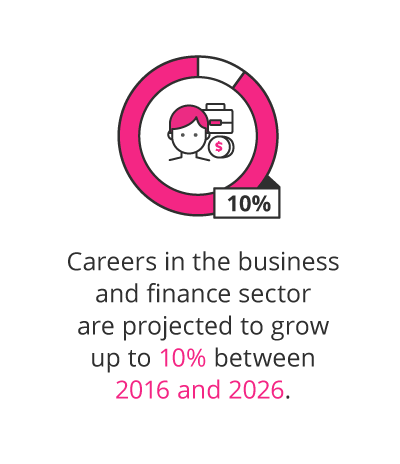GetSmarter Online Short Courses – Finance Portfolio | FAQs

Careers in the business and finance sector are projected to grow by up to 10% between 2016 and 2026 1. If you’re looking to become a New Professional in the lucrative financial field, you need to know when it’s time to upskill and which online short course from the GetSmarter Financial Portfolio will give you the best recognition for your expertise.

The GetSmarter Financial Portfolio has been curated with the modern financier in mind. These online short courses will help you fill multiple roles (depending on your chosen course) in the financial industry while keeping you ahead of the curve and confident in your abilities. You can complete any of the courses without previous higher education experience or you can build your existing education.
How will a GetSmarter finance course benefit my career?
The GetSmarter portfolio of finance courses are tailored for working professionals like yourself and can benefit you at any stage of your career path. Whether you’re emerging in the industry or have been working for over 15 years and want to refresh your knowledge, there is an online short course for you.
Which course is relevant for you?
Investment Management
Have over 15 years experience? The University of Cape Town Investment Management online short course is a great fit for you if you’re interested in empowering yourself with the diverse skills needed to intelligently manage your investment portfolio and be able to choose the right company, the right fund and the right investment strategy with confidence.

Bookkeeping
Have you just started your own business, and want to be able to manage your own finances? A Bookkeeping course will give you the confidence to implement tax, VAT and payroll processes and keep control of your inventories and financial transactions.

Financial Management
Want to get a foot in the door with a financial career? This Basics of Financial Management course, you’ll learn essential finance skills within a business context.
Why should I upskill in the finance industry?
Upskilling yourself in a given career path allows for quicker job progression and opens you up to more opportunities for a raise or promotion.
As seen in the GetSmarter Career Path Profiles, continuous studying and frequent updating of your hard and soft skills are necessary across all industries in today’s fast-paced work environment.
Two of the top positions within the financial sector are Chief Financial Officer and a Financial Manager. Both positions are in high demand, with a projected growth rate of 19% between 2016 and 2026 2, and require individuals with a high-level of financial finesse to help companies remain competitive and profitable.
Five key financial areas you should upskill in today
Cost and management accounting |
|
Payroll and tax administration |
|
Accounting |
|
Tax law |
|
Advanced project management |
|
Cost and management accounting |
|
Payroll and tax administration |
|
Accounting |
|
Tax law |
|
Advanced project management |
|
CONVINCED FINANCE IS FOR YOU?

Five FAQs GetSmarter Course Consultants receive on the finance portfolio
How will Financial Management help me?
The UCT Financial Management online short course is designed to help you understand and interpret functions such as: budgeting, cash flow, financial statements and cost-cutting to ensure you implement successful business management practices.
You’ll walk away from this financial management course with the confidence to:
- Navigate the landscape of tax – from income tax and VAT, to workers’ compensation
- Understand and interpret income statements, balance sheets and cash-flow statements
- Identify, evaluate, implement and monitor the potential value of investments in long-lived assets
- Manage the impact that working capital has on the cash flow of an organisation
Will I be qualified after the bookkeeping or accounting course?
No, you will not be qualified as a Bookkeeper or Accountant.
These courses are short, stand-alone skills certificates that add value and practical skills that can immediately be incorporated into your daily function.
Foundations of Financial Markets in South Africa and Investment Management: Can I trade after this course? What jobs can I apply for?
No, you cannot trade after Investment Management, but you can:
- Access offshore financial investments
- Analyse different investment philosophies and constraints
- Lead and estimate the basic return of an equity investment
- Distinguish alternative asset classes and their associated financial markets and products
PROFESSIONS:
- Financial Manager
- Assistant Financial Manager
- Financial consultant
- Operations consultant
- Financial advisor
- Client service consultant
- Financial administrator
- Financial controller
- Financial analyst
- Securities Trader (JM)
- Dealer/Trader
- Properties Manager
- Facilities Manager
Will I be a tax practitioner after the Tax Law course?
No, you won’t when studying the UCT Tax Law online short course.
In order to register as a tax practitioner with the South African Institute of Tax Practitioners, you will need the following:
SAIT’s minimum requirements for membership is as follows –
- An NQF level 4 qualification
- 5 years Tax based experience
I want to open a sideline business, will I be able to register with SARS?
You can register with SARS once you are a tax practitioner. SARS also has the following criteria:
- You must belong to or fall under the jurisdiction of a Recognised Controlling Body as referred to in s 240A of the Tax Administration Act (SAIT)
- Have the minimum qualifications and experience set by your Recognised Controlling Body (SAIT’s min requirements)
- Have no criminal convictions for the offenses described in s 240(3) of the Tax Administration Act
- Participate in continuous professional development programmes set by your Recognised Controlling Body
Which finance course should I do first?
We offer a broad range of financial courses. Depending on what you want to achieve and which skill set you want to improve, you are able to choose one suitable to your needs.
Want to change the trajectory of your career?